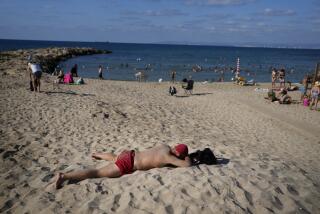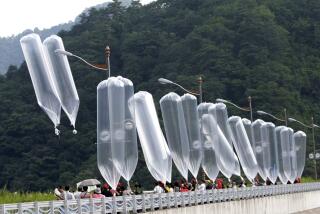Propaganda, Drills Ready Iraqi Home Front for War : Gulf crisis: Baghdad claims a million join a practice evacuation. The atmosphere is charged with forebodings.
- Share via
BANI SAD, Iraq — In the week since proposals for U.S.-Iraq talks reached a dead end, the atmosphere in Baghdad has become charged with forebodings of impending war.
On Friday, thousands of impoverished Iraqis in Saddam City, a north Baghdad suburb, participated in a practice air-raid evacuation.
At a dusty field outside Bani Sad, a drab town of squat, yellowish houses 12 miles northeast of the capital, about 4,000 men, women and children lolled in clusters on scattered mats, festively picnicking in the pale morning sun. Several thousand evacuees made their way to another concentration at Rashdiya, nearer Saddam City.
The government claimed that a million residents--a quarter of Baghdad’s population--took part in the exercise, a figure impossible to verify.
If war broke out, evacuees would be dispersed among families living in nearby provinces, civil defense officials said. “This is a precautionary measure for all eventualities,” said an official who gave his name as Ali Hussein, the Iraqi equivalent of John Doe.
Diplomats in Baghdad read into the evacuation at least two interpretations: a genuine need on the part of the government to organize the population, or at least to involve it in readiness activities; and the desire to signal Washington that Iraq is unbowed even under threat of attack.
Although the evacuation was the most palpable sign of civil defense preparation, Iraqis have been bombarded all week with lessons on how to get ready for war. Each night on television, ominous civil defense instructions promise the worst, and, in some ways, are more alarming than educational.
On one TV show, a picture of agitated molecules appeared on the screen, a voice explaining the concept of chain reactions. Then, a black-and-white image of a mushroom cloud appeared, and the real message began: Iraq may come under nuclear attack--protect yourself.
Rough drawings instructed viewers how to react to the explosion’s sudden flash by throwing themselves on the ground face down, feet toward the blast, and covering the backs of their heads with their hands. In another segment, a woman demonstrated how to use a dish towel, held over mouth and nose, as a substitute for a gas mask.
For some residents of Baghdad, there is an inescapable logic to the media blitz: It would be best to leave the city before Jan. 15, the deadline set by the United Nations for Iraq to pull out of Kuwait. After that, the vast U.S.-led military machine gathering over the horizon in Saudi Arabia is authorized to strike.
Baghdad is certain to be bombed, many residents believe, because a power plant, an oil refinery, military bases and the presidential palace all stand within the city limits.
“Every night, my wife asks me when we are going to go,” confessed a rug merchant in the bazaar at Rusafa, Baghdad’s inner-city commercial district. His cousin lives on a date farm near Karbala, southwest of Baghdad. The family could pack flour and clothes and be safe within hours, he said.
“She tells me no one is buying rugs anyway,” the merchant said. “We will see as the time gets closer.”
For others, the warlike climate has induced a gloomy fatalism. This is not, after all, the first time Iraq has mobilized for war.
“You must remember, we had eight years of war with Iran,” said Zeinab, a 30-year-old secretary for a foreign company. “We are used to this. I don’t think we will go anywhere. Just stay at home.”
Zeinab was watching television in her three-bedroom house in Adhamiiya, a middle-class district of Baghdad, when the mushroom cloud came on the screen. “Well, if it is atomic bombs, what good will that do?” she asked skeptically. “I mean, what was left of Hiroshima after an atomic bomb?”
In preparation for air raids, the government has ordered landlords to prepare bomb shelters. But it is unclear just how much can be done. Baghdad sits on a marshy riverfront, and basements are a rarity.
Instructions for blackouts also were issued in the official Al Thawra newspaper “to reduce the chances for enemy aircraft to see cities and vital targets.”
At the sound of sirens, residents are supposed to turn off lights, or, if in their cars, to stop and turn off headlights. In case of a surprise attack, power stations will be shut down.
In schools, children are receiving civil defense tips, such as how to hide under desks and how to wash off chemical poison.
“My son came from school and wanted to take a shower right away,” recounted Zubeide, who works in a bakery in Mansur, a wealthy neighborhood of the capital. “He thought the teacher meant he had to wash the chemicals every day. It is confusing for a 7-year-old.”
There is no indication the United States or its allies is preparing to use chemical or nuclear weapons.
But Defense Secretary Dick Cheney said Friday that an American attack against Iraqi forces is growing increasingly likely. Cheney promised cheering U.S. troops that they won’t sit indefinitely in the desert and said “absolute, total victory” is the only option if war begins.
Joining Cheney in hawkish pep rallies with troops in the northeast Saudi desert was Gen. Colin L. Powell, the Joint Chiefs of Staff chairman, who said he still hopes for resolution of the Persian Gulf crisis without war. But he then drew roars of applause when he pledged: “When we launch it, we will launch it violently; we will launch it in a way that will make it decisive so we can get it over as quickly as possible and there’s no question who won.”
In its war with Iran, Iraq attacked its own rebellious Kurdish citizens in the northern part of the country with poison gas.
In addition to the spurt of civil defense decrees, an expanded military draft decisively brought home the approaching zero hour. The government recently extended the age of draft eligibility to 33, bringing tens of thousands of men who thought they were free of duty back into the service.
Police randomly stop cars carrying youths to inspect their papers to see if they are subject to military service. In some neighborhoods, draftees are loaded into buses after being discovered by military police, who carry out lightning raids and inspections of stores and factories, looking for draft dodgers.
Apparently, not everyone is eager to go. The recent issuance of an amnesty for draft evaders and deserters suggested resistance.
To counter such reluctance, the government has fashioned a patriotic media campaign. Singers croon about the glories of Iraqi history.
On an episode of a daily army program, a parade of recruits was videotaped marching down a street in the town of Mosul; the parade was shown for 15 minutes without commentary, backed only by the tinny sound of recorded martial music.
Almost every night on television, units of soldiers at the front perform a chant of defiant slogans and pledges of loyalty to Iraqi President Saddam Hussein.
More than the defense of Iraq or Kuwait, it seems, the propaganda campaign centers on the glorification of Hussein.
New television images of the mustachioed leader show him atop a white horse as he inspects troops. Another presents him meandering through a crowd of adoring children as he pats them on the cheek and stoops to kiss them.
One musical interlude features shots of the omnipresent statues of the leader, who declared in an interview broadcast Friday on German television that “Allah is on our side” and that his troops will not pull out of Kuwait before the Jan. 15 deadline.
Predicting Iraq’s triumph in any combat, he added: “From our side, the door to dialogue remains open.”
In Iraq, the flip side of the propaganda effort is the intense attack on the United States in general and President Bush in particular.
Editorial cartoons are not subtle. One showed a boy and dog urinating on a Bush-faced Statue of Liberty. Washington’s ties with Israel are a favorite theme and, in one drawing, Bush is dressed as a centurion holding a shield decorated with the Star of David.
More to Read
Sign up for Essential California
The most important California stories and recommendations in your inbox every morning.
You may occasionally receive promotional content from the Los Angeles Times.













